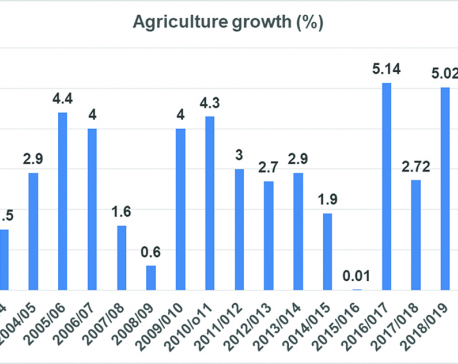
OR
Sidelines

Constraints of social disharmony, contested constitution and institutions plagued by centuries of nepotism and favoritism will not allow Nepal to be Singapore or Switzerland anytime soon
In the art of charlatanry, Premier Khadga Prasad Sharma Oli, even when not in full form, is capable of giving the best of snake oil salesman a run for his money. He hawked the trans-Himalayan railway dreams with remarkable success. His pension scheme appears promising on paper. The prospect of guaranteed employment or definite unemployment dole is music to the ears of his party cadres.
After completing a year of directionless governance, Supremo Sharma Oli did two more meaningless things to cover up his failings: Assure the public of a share in hydropower projects not yet on drawing boards and open a Shipping Office for non-existent waterways. The Supremo’s election slogan was ‘Prosperous Nepal, Happy Nepali’. The promise of prosperous Nepal looks like a pipedream. However, he has certainly succeeded in making quite a few Nepalis happy. He brings sardonic smile to the faces of audience whenever he appears in public.
In addition to the inherent audacity of an inveterate demagogue, the Supremo’s populist postures are based on the assumption that Nepalis are by and large gullible. After the royal-military coup in 1960, King Mahendra promised to do in a decade that others had taken centuries to achieve. He died unchallenged. King Birendra made an assurance every five years or so and failed to deliver on any one of them.
The ‘Zone of Peace’ proposal was doomed from the start as it didn’t have the sanction of Nepali Congress, which had more democratic legitimacy in the international community than the authoritarian regime of King Birendra. Courtiers of the king failed to convince New Delhi that the pitch was not against the spirit of the Treaty of Peace and Friendship. Promises of poverty eradication or achieving Asian Standard of Living were conceptually vacuous—society, politics and economy are so intertwined that it’s impossible to keep Bahunism intact, maintain xenophobic authoritarianism and hope to achieve economic transformation.
The lasting damage that the Panchayat regime caused to the psyche of Nepalis was King Birendra’s slogan of ‘politics for development’. It primed the people for the jingoistic jingle of ‘politics of prosperity’, which has become a bipartisan war cry of the Federal Democratic Republic of Nepal.
Perilous trajectory
Without social justice, human society runs the risk of reverting back to a state where might was right. Pursuance of justice, however, is precarious. Affected people are more concerned with their benefit than truth and justice and mount attack whenever the result isn’t in their favor. Conflicts then become inevitable. That’s where politics comes in with the idea of equality and fairness based on shared values.
It’s one of the foundational principles of governance that the resolution of existing, incipient and probable conflicts is the primary purpose of politics. A climate of peace in society and polity can be achieved in several ways. Autocrats use brute force to maintain stability. Totalitarian regimes create a culture of fear to obtain complete submissiveness. Authoritarian rulers arouse chauvinistic passion to gain obeisance.
Democracies, however, have to create conditions for the peaceful resolution of conflicts by allowing them to compete in the marketplace of ideas. That’s possible only when fundamental freedoms are guaranteed in the statute, protected by all institutions of the state and actively promoted by the media and civil society. Somehow the politics of prosperity tends to push fundamental freedoms to the backburner.
Toxicity of prosperity politics isn’t limited to the acceptance of unethical practices and immoral behavior as necessary conditions of making profitable deals. Its growth trajectory has certain inalienable characteristics that weaken democratic culture from within.
Prosperity requires primacy of businesses over the people. Profit considerations figure higher than the public good. Businesses hate uncertainty and love rulers that can guarantee stability. That often leads to what has been called the Strongman Temptation. It’s not unusual for Nepali conservatives and revisionists to yearn for another Mahendra or even a Jang Bahadur despite all that they did for themselves and didn’t do for their subjects.
It’s foolish to draw an analogy between what’s past and the present, but indicative lessons can be useful in comprehending contemporary realities. When newly-enthroned King Gyanendra began to unfold his phased-coup with the dissolution of House of Representatives in May 2002 and dismissal of the ‘incompetent’ Prime Minister Sher Bahadur Deuba soon afterwards in October, seekers of prosperity of the profit sector, media and civil society applauded with unrestrained enthusiasm.
Even when the phased-coup culminated in the February First move with Chairman Gyanendra assuming all powers, quite a few prosperity-seekers didn’t stop hoping for deliverance. The Strongman Temptation in politics of prosperity is so strong that businesses recently approached the Prime Minister ‘to do something’ about interest rates of profit sector banks that are supposed to respond independently to market forces.
When businesses are ready to surrender their freedom, politicos and bureaucracy can’t be far behind. Supremo Sharma Oli is the Party as well as the Government—metaphorically speaking, he is ‘the State’ with committed judiciary, rubber stamp legislature, loyal constitutional organs, ‘Oliar’ intelligentsia, palanquin-bearers of the press and the celebratory civil society competing with each other in singing paeans in his praise. All that the letterhead Chairman of the NCP Double can do is show his presence by issuing meaningless statements that have no relevance in determining either domestic or foreign policies.
Meanwhile, institutions and instruments of state are ever ready to silence voices of dissent. Those critics that persist are denounced, defamed and made irrelevant by drowning them in the cacophony of state-sponsored condemnation. If none of such tactics work, there is always the ‘peaceful resort’ of keeping a suspect in judicial custody for as long as the regime feels it’s necessary. Forget CK Raut for a while, the prosecution has failed to prove even one of its various charges against parliamentarian Resham Chaudhary to date.
Then there is the ultimate weapon of governments where citizens exist to protect the State rather than the other way round—physical elimination. Ram Manohar Yadav was allowed to die, if not killed as is being alleged by his family and friends, in police custody for the ‘crime’ of intending to show or actually showing black flag to the Deputy Prime Minister of the country. Anything is possible and everything is permissible in a state which practices politics for prosperity rather than justice.
The ostensible Opposition—the Nepali Congress—is in no better shape than the ruling coalition with close to three-fourth majority in the parliament. The post-truth vanguard of one-fourth Opposition also swears by the politics of prosperity and professionals helicoptered into the party headquarters sneer at the socialistic sermons of BP Koirala in private even when they garland his portrait in public.
In decision-making, Chairman Sher Bahadur Deuba, despite his past shenanigans and present ineptitude, is the Nepali Congress for all practical purposes. The Koirala Family that nurtured the political outfit as a family enterprise for several decades lost its aura once the dotard of the clan in Baluwatar entered into a Faustian bargain with the Stalinists and Maoists through 16-Point Conspiracy. There are more Oliars in NC these days than in their parent party.
Risky endeavor
The political economy of prosperity is predictably dicey. In near-stagnant economies with extremely high unemployment, underemployment and disguised employment, it requires extensive programs of government spending. When resources are scarce, the motto of the government is then ‘borrow to the hilt’ with sovereign guarantees.
Availability of credit to countries with weak institutions often leads to misplaced priorities and whimsical investment decisions. Rather than importance of the project or its economic viability, unearned money, which is what all loans appear to be, encourages demagogic leaders into taking populist decisions and creating white elephants in the name of infrastructure. The harbor and airport of Hambantota in Sri Lanka are symptomatic of extravagance of borrowed money rather than aberrations.
The cost of trans-Himalayan Railway will have to be borne by Nepalis toiling in Arabia and Malaysia. Interests and installments of Bhairahawa and Pokhara airport will begin to mount even before they are fully functional.
Constraints of social disharmony, contested constitution and institutions of the state plagued by centuries of nepotism and favoritism will not allow Nepal to be Singapore or Switzerland anytime soon. Nepal is more like a Hindu Pakistan with its ethno-national society and dysfunctional polity that has the defense forces as its prime mover.
Flying high is possible, but that will require developing strong wings with incremental changes in a democratic manner. The sight of a raven flying higher than the clouds is either transitory or illusory if not downright dangerous.
You May Like This

Investment for prosperity
Sources of investment lie in our doorsteps but Nepal is still reeling under low investment trap inimical to achieving prosperity... Read More...

Erratic pattern
Agriculture in Nepal is suffering from years of under-investment, limited research, scant inputs and lack of technology and services for... Read More...

Restricting investment
Nepal must adopt liberal laws and provide much better opportunities than other Asian countries if it is to become an attractive... Read More...







Just In
- NRB to provide collateral-free loans to foreign employment seekers
- NEB to publish Grade 12 results next week
- Body handover begins; Relatives remain dissatisfied with insurance, compensation amount
- NC defers its plan to join Koshi govt
- NRB to review microfinance loan interest rate
- 134 dead in floods and landslides since onset of monsoon this year
- Mahakali Irrigation Project sees only 22 percent physical progress in 18 years
- Singapore now holds world's most powerful passport; Nepal stays at 98th












Leave A Comment